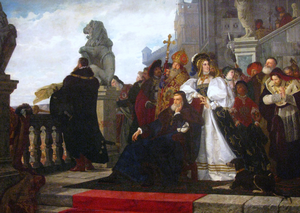Chicken war
The Chicken War (Polish Wojna kokosza ) is the name for an anti-monarchist and anti-absolutist rebellion (Polish rokosz ) of the Polish Szlachta , i.e. the middle and lower nobility with its center in today's Galicia . The derogatory term for the war was the magnate attributed to the higher nobility, mostly the King supported and maintained that the only effect of the "war" was the near-extinction of locally requisitioned by the nobles chickens during the " Rokosz " in Lviv been . The description of the rebellion by the magnates with “ kokosz ” (German: laying hen ) may be inspired by a play on words between “ rokosz ” and the similar sounding “ kokosz ”.
At the beginning of his reign, King Sigismund I, the Elder , inherited a kingdom of Poland with a centuries-old tradition of freedom of the nobility, confirmed in countless privileges . Sigismund faced the challenge of consolidating internal power against external threats to the country. During the reign of his predecessor, Alexander I , the statute of " Nihil Novi " (Nothing New) was established, which forbade the kings of Poland to pass laws without the consent of the Sejm , the Polish diet. This proved crippling in Sigismund's negotiations with the Szlachta and the magnates, as well as a serious threat to the country's external stability. With a view to strengthening his power, Sigismund enacted a series of reforms, established a conscription army in 1527, and expanded the bureaucratic apparatus necessary to rule the state and finance the army. With the help of his Italian wife, Queen Bona Sforza , he began buying land to expand the royal estate. He also began a process of restitution of royal property that had previously been pledged or given as fief to members of the nobility .
In 1537 the king's policy led to a major conflict. The Szlachta gathered near Lemberg for a levée en masse and demanded military intervention against Moldova . In any case, the small and middle nobility proclaimed a rokosz , a semi-legal rebellion , with the intention of making the king abandon his reforms. The nobles presented him with 36 demands, including the most important:
- An end to further land acquisition by Bona Sforza
- Liberation of the Szlachta from tithing
- Rather an adjustment than an expansion of the state treasury
- Confirmation and expansion of the privileges of the nobility
- Abolition of the duty or exemption of the nobility from it
- Adoption of a law on incompabilitas - the incompatibility of certain offices in one hand (e.g. that of the Starost with that of the voivode )
- Adoption of a law that only allowed members of the local Szlachta to take on local offices
- Creation of a permanent advisory body for the king
The protesters eventually criticized the role of Queen Bona Sforza, who they accused of “ poor upbringing ” the young Prince Sigismund August (the future King Sigismund II August ) as well as trying to expand her power and influence in the state.
It soon transpired, however, that the Szlachta leaders were at odds and that it was almost impossible to reach an agreement. Too weak to begin a civil war against the king, something like a compromise was eventually accepted . The king rejected most of the demands, but accepted the principle of incompabilitas in the following year and agreed not to allow Vivente Rege , during the lifetime of the ruling king, to elect the future king .
Thereupon the Szlachta returned home and had achieved little.
